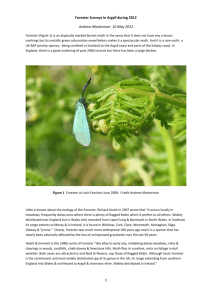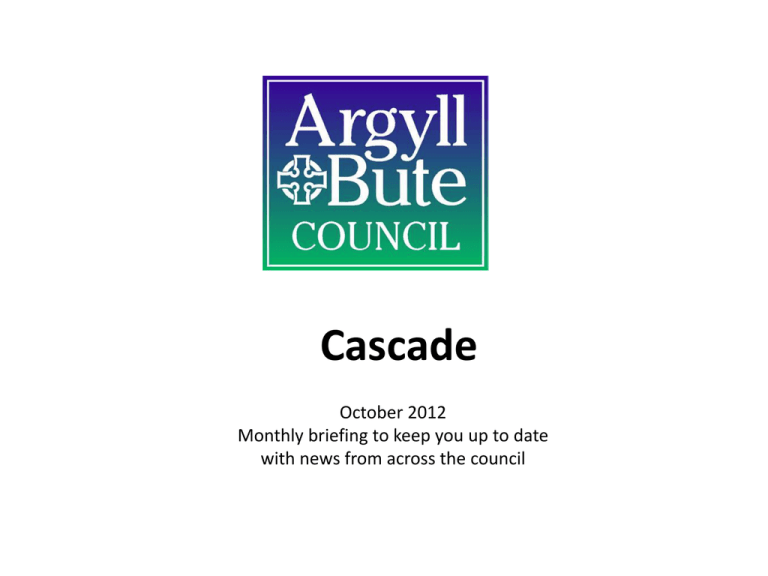
Cascade
October 2012
Monthly briefing to keep you up to date
with news from across the council
Contents
• Keep calm and carry on?
The importance of effective business continuity plans
• We Can Stop It
Council supports national rape prevention campaign
• Mystery Shopper
How we respond to customers
• Going places?
New centralised booking system for travel and accommodation
• My HR
Got an HR question? Find the answer quickly with new web page and
helpline
• Keeping in touch
It’s good to talk – new links between services and communications
team
• Making best use of our assets
Draft arrangements for transfer of assets to third sector
Business
Continuity
Planning
What happens if disaster strikes? Do we keep calm and carry on? Or is there a
little more involved?
Find out more about the importance of effective business continuity planning.
What is business continuity planning?
Business continuity planning involves creating thorough and comprehensive
plans which enable the council to restore quickly the delivery of essential
services following events which disrupt normal arrangements.
Both the Scottish and UK governments see business continuity planning as
being just as important as emergency planning (often referred to as civil
contingencies, to reflect the statutory framework).
Business continuity planning is NOT:
• Dealing with the emergency incident itself
• Dealing with incidents having a national impact
• Dealing with every council activity
What is business continuity planning?
Sometimes it can be difficult to distinguish business continuity planning from the
emergency response itself, but there is guidance for managers to help them
apply their resources to restoring vital services.
The civil contingencies team help to co-ordinate the council’s response to the
emergency itself.
It is not feasible to produce detailed plans for every single activity that the
council provides – but it is important to think about activities within your service
that are critical and that may require business continuity planning.
Why do we need business continuity plans?
It’s easy to see the impact that unpredictable disruption can have on services – for
example, harsh weather conditions and storms affecting our ability to deliver normal
services.
Argyll and Bute Council needs to have robust and practical plans in place to cope
with unexpected service disruptions.
If we don’t, there is a risk of significant loss. Unplanned arrangements could incur
considerable costs or even legal action for failure to deliver critical services. The
council’s reputation could be damaged in terms of political leadership, strategic
decision making or management competence. Essential services need to be
maintained.
We have a legal duty to meet obligations to service users – and we also have a
statutory duty for business continuity planning generally and for specific services like
social work, under the Civil Contingencies Act 2004.
How do we do it?
As well as having robust and comprehensive plans in place, we also need to make
sure that staff know and when to implement them.
Business continuity has to be embedded in our day to day work and there are a
number of ways that this can be achieved.
Understanding how the council operates; determining business continuity
strategies; developing and implementing a response; and exercising, maintaining
and reviewing, is all part of effective business continuity planning management.
Look at your service and identify which activities are ‘critical’. There is no agreed
definition, but could be an activity which must still be delivered following an
unexpected incident which would prevent it being delivered in the normal way.
The council has to assess its own service activities and make objective decisions
about which activities should be prioritised when it’s not possible to maintain
‘business as usual’.
How have we been doing it?
• Glen Abbot worked with council staff in 2008 and produced a list of 110 ‘critical’
activities – this has also included scoring by service managers, a trigger level set
by SMT and a final list approved by SMT
• Internal and external audits indicated that the system we were using could be
improved – leading to a review project launched in February 2012.
• New tools and improved systems were developed – including impact
assessments and a SharePoint site
• We consulted with communities, businesses and other public sector
organisations
• We have a new assessment process
• New recovery plans for all critical activities have been produced
• We are raising awareness among all staff about the importance of embedding
business continuity in normal service arrangements.
What critical activities are within each service?
Chief Executive’s Unit
• Treasury management
• Corporate communications during an incident
• Liaison with Civil Contingencies Unit
Customer Services
• Litigation – ongoing court actions
• Elections, during election period
Development and Infrastructure
• Roads and Amenity – storm damage; winter maintenance; emergency road defects
• Planning and Regulatory – dangerous buildings; public health; food health and safety;
petrol safety; product safety; aspects of animal health
• Economic Development – essential ferry services
Community Services
• Children and Families – child protection; vulnerable people; adoption; fostering;
residential care; criminal justice
• Adult Care – care at home; residential care; telecare; vulnerable people
• Community and Culture – homelessness
• Education – education service during critical periods
What about you?
Think about your service:
• Do you know if your service delivers or supports a critical activity?
• Who invokes the plan? How? When?
• What is in the recovery plan?
• Are there any gaps in the plan?
• Could your plan be implemented in practice?
• What would your role be?
What do we need?
Recovery plans ask managers to identify essential resources under each of the
following headings:
• People
• Systems – IT and/or manual
• Premises – is relocation required?
• Equipment
• Suppliers/contractors
• Communication
The plans also consider four scenarios and what actions would be required if:
• There is no access to the building
• A high percentage of staff are unavailable
• ICT systems are unavailable
• A key supplier or partner business is disrupted
Services rarely operate in isolation and it is also important to identify all other
services that support critical activities. Heads of service have signed off agreements
to ensure that assistance will be available.
Recovery Plans – where we are now?
Service
Number of recovery plans
Status
Strategic Finance
1
GREEN
Improvement & HR
2
GREEN
Adult Care
22
RED
Children & Families
23
RED
Homelessness
7
GREEN
Governance & Law
2
GREEN
Economic Development
1
AMBER
Planning & Regulatory
6
AMBER
Roads & Amenity
1
AMBER
Status / Action Required: Green – minimal / Amber – moderate / Red – significant
What happens next?
• Regular awareness raising of the importance of effective business continuity
planning – for all staff and new starts
• Training for area emergency response teams
• Schedule of exercises to test all recovery plans
• Self assessment by managers
• Regular audits and improvements
Your business continuity planning contacts in Argyll and Bute Council are:
•
•
•
•
Chief Executive’s Unit –
Community Services –
Customer Services –
Development and Infrastructure –
Ernie Brown
Helen Thornton
Iain Jackson
Lesley Sweetman
They will be happy to help with any queries you may have.
We can stop it – rape prevention action
A Scotland-wide police campaign is seeking to raise awareness of recent changes in the
law on rape and sexual assault. ‘We can stop it’ uses young men in the 18 to 27 age
group to act as positive role models, asking men to consider their own behaviour and
the part they can play in preventing rape.
Under the Sexual Offences (Scotland) Act 2009, previous legislation has been reformed
and a new range of offences created, including:
• Sex when a victim is asleep or unconscious
• Sex without consent due to inebriation
• Male rape
Argyll and Bute councillors are keen to support ‘We can stop it’ – emphasising that
while many people associate rape with a violent assault by a stranger in a dark alley, in
reality most rapes are carried out by a partner, an acquaintance, a friend or a date.
Find more information on the campaign at www.wecanstopit.co.uk
Customer Service Mystery Shopping Outcomes
• Each year since 2010 the council has asked an independent company to
mystery shop council services to test the standard of our customer service.
• The exercise has three purposes:
To check performance against our customer charter standards
To benchmark against other councils’ performance
To identify any areas of customer service delivery weakness that can be
improved.
Customer Service Mystery Shopping Outcomes
This year’s exercise has shown an encouraging improvement in results for all our
main customer contact channels:
-
Telephone contact scored 87 per cent (79 per cent last year )
Email handling scored 77 per cent (75 per cent last year)
Letter enquiry handling scored 64 per cent (55 per cent last year)
Face to face enquiries scored 88 per cent (86 per cent last year)
Argyll and Bute Council performed above the national council average for email,
letter and face to face contacts.
Customer Service Mystery Shopping Outcomes
The exercise evaluated performance against our Customer Service Charter
pledges and found that:
-
Twelve measures had improved
Three were unchanged
Three were worse
The full outcomes and the report analysing the findings are available on the
Customer Service Toolkit on the Hub and have also been made available to
customers on the Customer Charter pages of the council website.
Customer Service Mystery Shopping Outcomes
Although improvements have been made, the exercise highlighted a number of areas
where we can all contribute to improving performance:
Telephone
• Please give a salutation when answering the phone (hello, good morning, you are
through to, etc) as well as the department or service name when answering the
phone. Managers – please cascade and monitor.
• When transferring a call, tell the caller where (and who, if possible) they are being
transferred to.
Emails and Webmails
• A third of email responses did not include a name, job title or contact telephone
number. These are the basic elements of an electronic email signature for which
there is guidance on the Hub. Check you have an email signature on your personal
email account and that there is one on any generic team email accounts that you use.
Customer Service Mystery Shopping Outcomes
Letters
• Thirty per cent of letters received NO reply. Please ensure that all letters you are
responsible for handling have a response within the Charter standards. This will be
subject to more intensive checks in the future.
• Only eight per cent of shoppers said that replies were friendly. Friendliness of tone
helps to ensure the council is not seen as a bureaucratic, impersonal organisation. As
a minimum, please thank the customer for their letter or enquiry.
New travel/accommodation booking system
A pilot for the centralisation of all travel and accommodation bookings for Customer
Services and Development and Infrastructure Services ran between March and May
2012.
Following the completion of the pilot, an Outcomes Report was taken to the Admin
Review Project Board and SMT, where it was agreed that the pilot had been
successful and that the centralisation of all travel and accommodation bookings be
rolled out across all departments.
It was also agreed that three permanent Purchasing Assistants would be appointed
to fulfil this roll within the Corporate Sourcing Team – Cameron McGeachy, Mairi
McKinven and Claire Large.
Information about travel and accommodation request forms has been
communicated to all staff and the new system rolled out across all departments
from Monday 1 October.
New travel/accommodation booking system
In the meantime, the Procurement and Commissioning team would like to hear
from those employees within Community Services and the Chief Executive’s unit
who are currently responsible for the booking of travel and accommodation, to
learn of any special rates you have negotiated and to obtain details of
frequently used providers who offer a good service. This will help to maintain
and develop a database of providers and to maintain consistency in the
standard and quality of accommodation booked.
If you have any information or questions, please contact Cameron McGeachy on
01546 60 4395 or Mairi McKinven on 01546 60 4869 or email them at
purchasing@argyll-bute.gov.uk
Thank you to all staff for your cooperation and patience as this new process is
rolled out.
Many thanks,
Procurement and Commissioning Team
New HR page on The Hub
• HR have launched a new look employee information page called MyHR at
http://intranet.argyll-bute.gov.uk/Pages/My HR.aspx
• Employees will now see all HR information in clearly defined areas which
are quick and easy to find.
• If you cannot find the information you are looking for on the Hub page or
if you have any further queries regarding HR policies and procedures you
can now call our new advice line (Tel: 01546 605 513 (press 2), open
Monday to Friday 9am to 5pm) or email hradviceenquiries@argyllbute.gov.uk
New contact telephone number for HR
A new employee information line to compliment the new look ‘MyHR’ page on The HUB
has been set up. HR advisors will be available to answer any queries employees may have if
they cannot find the solution on the MyHR Hub page.
The telephone number for MyHR for reporting sickness/absence or contacting HR for
advice is:
01546 605 513
You will be prompted to:
– Press 1 for the Absence Line – to report sickness absence
– Press 2 for the HR Advice Line – for any HR queries/advice
The Absence Line is open Monday – Friday from 07.00 – 17.00.
The HR Advice Line is open Monday – Friday from 09.00 – 17.00.
Employees can also contact the HR Advice team via email on:
hradviceenquiries@argyll-bute.gov.uk
Contacting HR Teams
Further to a recent re-structure within HR please find below the new HR team email addresses which
should now be used. If you would like further details on any of the teams please see MyHR on The
Hub.
HR Queries and Advice
For HR queries regarding policies and procedures or for general advice please visit our new MyHR page.
If you cannot find the answer to your query you can call MyHR to talk to an advisor on 01546 605
513 or email :
HRadviceenquiries@argyll-bute.gov.uk
HR and Payroll Transactions Team
• Contractual Team: contractualenquiries@argyll-bute.gov.uk
• Attendance Team : attendanceenquiries@argyll-bute.gov.uk
• Payroll and Pensions Team : payroll&pensionsenquiries@argyll-bute.gov.uk
• Recruitment Team : RecruitmentEnquiries@argyll-bute.gov.uk
Corporate Support - HRcorporatesupportenquiries@argyll-bute.gov.uk
Employee Relations - HRemployeerelationsenquiries@argyll-bute.gov.uk
Development Team - HRdevelopmentenquiries@argyll-bute.gov.uk
HR Postal Mail
•
•
•
•
Following restructure within the HR service, all postal mail for HR and Payroll
teams must be sent to the following address:
FAO Improvement and HR
Argyll and Bute Council
Whitegates Office
Whitegates Road
Lochgilphead
Argyll
PA31 8SY
Please do not send any postal mail to the HR Offices in Kilmory/Dunoon or
Campbeltown from this date.
Please note: Time sheets only should still be sent for the attention of Argyll and
Bute Council, Improvement and HR, Witchburn Road, Campbeltown, PA28 6JU.
If you have any queries regarding postal mail please do not hesitate to contact
hrdevelopmentenquiries@argyll-bute.gov.uk
Keep in touch!
Argyll and Bute Council’s communications team is here to help you – and now each
council service has been allocated a communications officer to work alongside:
•
•
•
•
Development and Infrastructure –
Community Services –
Customer Services –
Email -
Lindsey Ingram (01546 604105)
Sheila Faichney (01546 604016)
Aileen McNicol (01546 604103)
press@argyll-bute.gov.uk
Over the coming months, we’ll be getting to know your service better – and while
most people may know us from dealing with reactive press enquiries, we are also
keen to hear about the good news stories in your service and teams.
We can help in lots of different ways. Do you have a brochure or leaflet to produce?
Some material to write? A photo opportunity? Contact the communications team for
support with all this and more.
Making best use of our assets
• Argyll and Bute Council holds each of its property assets as a resource to be used in
service delivery and to support and contribute to its corporate objectives.
• However, the council also has a key role to play in supporting the third sector to
provide important services in our communities.
• Transfer of some council assets to third sector organisations can help to empower
communities as well as achieving better value for money and sustainable outcomes
for both the council and the wider community.
• When councillors met on Thursday 20 September, they agreed the Draft Third Sector
Asset Transfer arrangements – the start of a formal framework which will provide a
rigorous and fair process to follow when considering whether to transfer an asset.
• The process will assess and identify the capability of applicants to sustain the asset
on an ongoing basis, as well as highlighting any wider benefits to the community that
may arise.
Making best use of our assets
Background
• In 2010 the council agreed that suitable arrangements should be put in place to support
the transfer of assets to the third sector.
• The Demonstration Project Board worked on the asset transfer pack initially; final stages
of consultation and proposed implementation are being monitored by the Third Sector
and Communities CPP sub-group.
• SMT recommended a panel to oversee the process, including representatives from
various departments.
• A prioritisation approach was agreed by the sub-group.
• Potential conflicts with Community Right to Buy legislation have been explored.
• In common with other local authorities, work is ongoing on appropriate dissolution
clauses for protection in the event of problems with a third sector organisation which
takes over an asset.
• Business cases will play an important part in any asset transfer process.
Got something for Cascade?
Cascade is normally issued to managers on the first Friday of the month, and
goes live on The Hub one week later.
If you have anything for future issues of Cascade please send it to the
communications team at:
cascade@argyll-bute.gov.uk
or contact Aileen McNicol on 01546 604103. Cascade depends on your
contributions, and we’re happy to help with layout, content and presentation
if you wish.
The next Cascade is due to be distributed on Friday 2 November.
If you have anything you’d like included, please send it by Friday 26 October.
We can help with formatting and creating slides – don’t hesitate to call if you
would like some assistance with this or any other communications
issue.

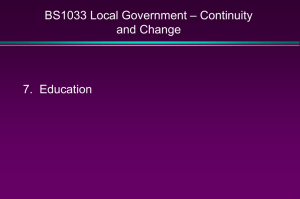
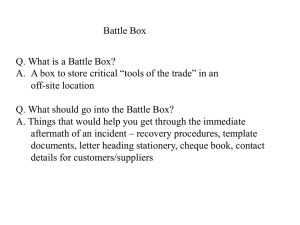
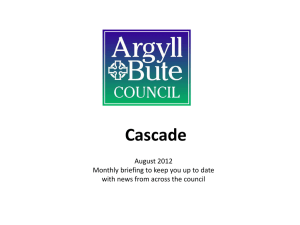
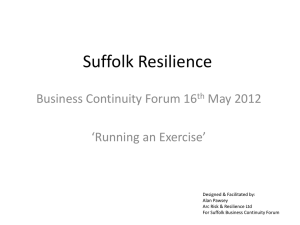
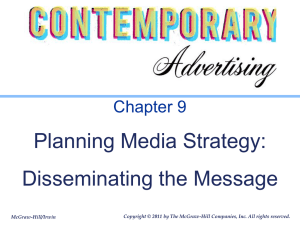
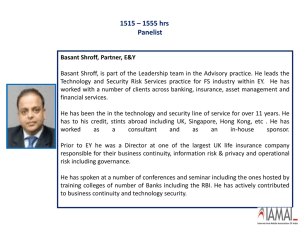

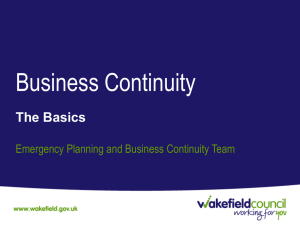
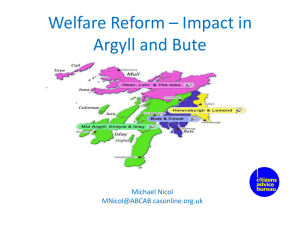
![8. BHWN Teenage Transitions Final[2]](http://s3.studylib.net/store/data/006624221_1-e679ca566bba0a8c52da4d78c25d03d3-300x300.png)
